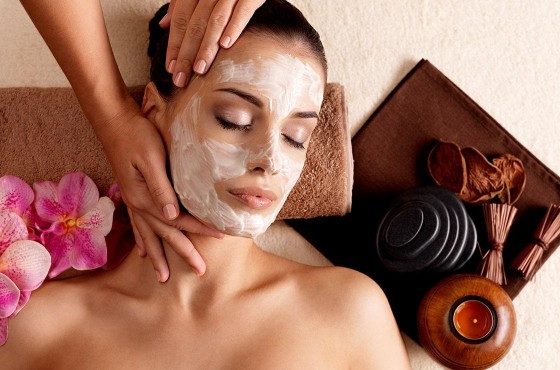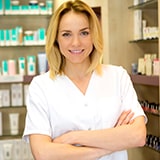Banishing blackheads
Written by Marion, Aesthetician/Cosmetician | published on | updated on 18/04/2024

Blackheads are sometimes no more than a mere unsightly nuisance. However, if you don’t take action, they can quickly get out of hand and lead to the more visible signs of acne, such as spots and cysts. So, should blackheads be removed, and if so, how?
What causes blackheads?
To understand the appearance of these tiny, dark plugs that block the skin’s pores and make them appear double the size, you also need to understand acne because blackheads are one of its first symptoms.
Acne is a skin condition which is usually harmless and starts with the excess production of sebum in the sebaceous glands. These are located at the base of the hair follicle (a small, bag-like structure from which the hair grows). There they release the sebum, a substance which is not harmful by itself. In fact, it helps to protect the skin and is part of the hydrolipidic film - a barrier that stops skin from drying out and protects it from microbial attack.
However, in certain cases, the sebum becomes thicker, increases in volume and then tends to block the skin’s pores. This is when blackheads appear. Blackheads are not serious in themselves. However, they can be unsightly and may constitute the first step towards a skin infection or inflammation. Therefore, if they are well-developed, it might be sensible to attempt to remove them or to prevent them from forming, but this must be done in line in a hygienic manner.
What contributes to the appearance of blackheads?
- Hormonal factors: during puberty, increased levels of hormones, especially male hormones (androgens), stimulate sebum production. This explains the almost inevitable appearance of blackheads and acne in teenagers (with at least 80% of them affected). In adults, it may also be linked to hormonal disruptions (such as pregnancy, menopause and taking or stopping certain contraceptive pills).
- Genetic factors: not everyone is affected in the same way. It seems that some families are simply more prone to blackheads and acne than others.
- Mechanical and chemical factors: exposure to atmospheric pollution and some other substances creates favourable conditions for blackheads to form. For example, people who work with petroleum products, cooking oil or some chemical products may find that these substances damage their skin is damaged and block their pores.
- Unsuitable cosmetic products: the overuse of oil or powder-based cosmetics tends to block the pores and contributes to the appearance of blackheads.
- Dietary factors: sugar and foods with a high glycaemic index increase the availability of the male hormones that stimulate sebum production.
What is the best method for removing blackheads?
Blackheads may develop into spots and pustules. It is therefore advisable to care for your skin properly and unblock the pores as much as possible. But this must be done with care!
One thing is for sure: attempting to remove blackheads by squeezing the skin between your nails at the slightest opportunity is the very last thing you should be doing. This will just allow the bacteria underneath the nails and present in the already infected pores to grow wherever it pleases on your skin, particularly in the micro lesions caused by scratching and squeezing the skin, which simply makes the matter worse.
- A blackhead remover can help you remove blackheads without squishing your skin between your fingers. This process will be easier if you do it straight after a facial sauna (where you place your face above a bowl of steam). Afterwards, you should cleanse your skin thoroughly to prevent bacterial growth.
- Clay or activated charcoal masks are very effective. As they dry, they shrink and pull out some of the blackheads. This is also enhanced by their absorbent properties.
- Anti-blackhead strips have the same effect: usually designed to be applied to the nose, the strip sticks to blackheads and removes them when peeled off. However, these strips should not be used on delicate, sensitive or flaky skin.
- A blackhead extractor or aspirator should be used only sparingly because when the blackhead is drawn out, this tends to enlarge the pores.
- Dermatologists offer skin treatments during which the skin is first cleansed using an acid preparation before the blackheads are removed with a mini-scalpel. These experts can also improve the appearance of acne scarring through laser treatment.
Effective habits and natural treatments to get on top of blackheads
How can blackheads be eradicated? Start by choosing gentle, non-damaging cosmetic products, such as those from our range of scrubs and exfoliators. There is nothing to be gained by stripping the skin of its natural oils, even if the skin is oily, as this will only stimulate sebum production.
Pay attention to your diet: reduce sugar and fat, but consume oily fish and good vegetable oils. Omega 3 fatty acids are known to reduce inflammation. A diet rich in good micronutrients (in other words, rich in fruits, vegetables, wholegrain cereals, white meat and fish) promotes the effective regeneration of skin cells, as well as being good for your overall health. Zinc reduces acne and it may be useful to take it in dietary supplements (click here to see our full range of dietary supplements for beautiful skin).
Take care when exposing your skin to the sun: it is likely to make the skin’s outer layer thicker, which then retains sebum, creating the illusion of improvement. However, the blackheads will generally return again.
Beware of dermatillomania!
A mouthful of a word, but what does it actually mean? It describes an obsessive compulsive disorder giving rise to anxiety which manifests itself in constant scratching and picking at the skin, particularly in acne sufferers. The more the skin is touched, the more damaged it becomes, increasing the number of the blackheads and spots. The golden rule is “don’t touch”! In genuine cases of dermatillomania, a psychologist may be able to help the sufferer resolve problems with anxiety and lack of self-confidence which may be behind this OCD.
Great products for beautiful skin
As a general rule, when it comes to removing blackheads, you should treat adult acne as you would teenage acne. There are natural products to help reduce the severity of outbreaks, which can also treat acne scarring or even prevent it from occurring at all. For example, products containing wild pansy help to reclose the pores and remove toxins. To gently remove blackheads and prevent their recurrence, you could try a deep-cleansing scrub containing plant extracts or essential oils. Applying hazelnut oil to blackheads and spots will also reduce them.
Cocooncenter has a huge range of natural treatments for blackheads, acne and the resulting skin complaints. These more natural products can minimise the side effects that are the main disadvantage of medical treatments.
Don’t let blackheads disrupt your life. Gentle, natural, regular skincare is the key to eradicating those tiny infected pores.
Blackheads: three key takeaways:
- Blackheads are made up of dead skin cells and excess sebum;
- Removing blackheads with your fingers will only aggravate the problem;
- Cleansing your skin with healthy, natural products will reduce the appearance of blackheads without damaging your skin, particularly the hydrolipidic barrier which is essential for maintaining its balance.























